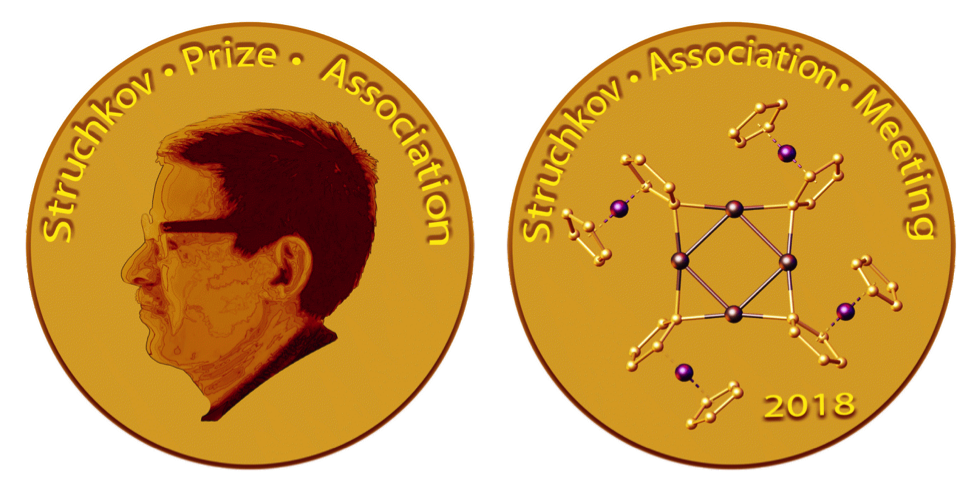Competition of Young Scientists for the Struchkov Prize Summed up the Results
I-Winners • First prize:
- Mikhail A. Kinzhalov - Ph.D. of Chemical Sciences, Associate Professor
Saint Petersburg State University,
Institute of chemistry, Department of physical organic chemistry
‘Structure-properties relationship in acyclic diaminocarbene complexes of late transition metals’
- Kirill V. Kovalev - master's degree
Moscow Institute Of Physics And Technology,
Laboratory for advanced research of membrane proteins
‘Obtaining high-resolution spatial structures of membrane proteins-optogenetics tools’
II-prize-Winners • honorable mention:
- Anna A. Sinel'shchikova – Ph.D. of Chemical Science, Senior Researcher
Frumkin Institute of Physical chemistry and Electrochemistry
‘Supramolecular ensembles based on porphyrin macrocycles’
- Ilya Yakushev - candidate of chemical Sciences, research associate
Kurnakov Institute of General and Inorganic Chemistry (IONKh RAS)
‘New heterometallic carboxylate complexes of platinum and palladium: structure study using synchrotron radiation and catalytic properties’
Reference:
The Struchkov Prize is annually awarded to young scientists for the best research work in the fields of chemistry, crystal chemistry, or material science. Since 2000, the prize fund of the competition for young scientists was formed annually from the funds of the Struchkov Prize Association, which unites students and former colleagues of Yuri T. Struchkov, working and living abroad. Since 2013, the award Fund has increased due to voluntary donations from scientists working in Russia.

RUDN University summed up the results of the competition among scientific student societies and scientific circles. The GreenLab of the Institute of Ecology became the best Student Research Society, the second place was taken by the Institute of Foreign Languages, and the third place - the Faculty of Humanities and Social Sciences.
There are approximately 1,600,000 children in Russia with confirmed attention deficit hyperactivity disorder. The necessary therapy is not always available to their families due to cost or the lack of specialized centers nearby. Teachers and students at RUDN University and Altai State University have developed a special app for these children that increases attention and reduces anxiety using the color photostimulation method.
Student science and popularization tour club has been operating at the Institute of Environmental Engineering for five years now. It was established under the auspices of the GreenLab Student Scientific Society.
RUDN University summed up the results of the competition among scientific student societies and scientific circles. The GreenLab of the Institute of Ecology became the best Student Research Society, the second place was taken by the Institute of Foreign Languages, and the third place - the Faculty of Humanities and Social Sciences.
There are approximately 1,600,000 children in Russia with confirmed attention deficit hyperactivity disorder. The necessary therapy is not always available to their families due to cost or the lack of specialized centers nearby. Teachers and students at RUDN University and Altai State University have developed a special app for these children that increases attention and reduces anxiety using the color photostimulation method.
Student science and popularization tour club has been operating at the Institute of Environmental Engineering for five years now. It was established under the auspices of the GreenLab Student Scientific Society.